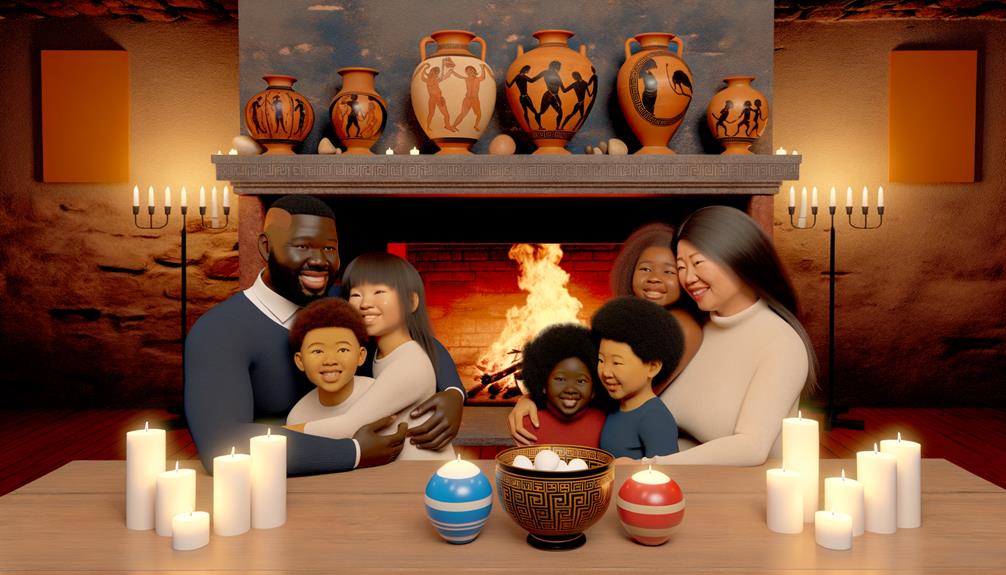Greek Meaning of Love in the Bible: Deeper Understanding
When I explore the Greek meanings of love in the Bible, I uncover four distinct types: Agape, Philia, Eros, and Storge. Agape represents selfless, unconditional love, which is central to Christian teachings and exemplified by Jesus’s sacrifice.
Philia, or brotherly affection, emphasizes mutual respect and camaraderie. Eros denotes passionate, romantic love, though it’s not explicitly highlighted in biblical texts.
Storge signifies natural, familial love, focusing on the bonds within families. Each type reveals a different aspect of God’s design for relationships, encouraging deeper understanding of how love shapes our faith and interactions.
Discovering these nuances broadens our grasp of biblical love.

The Four Types of Love in the Bible: Greek Meanings Explained
| Greek Word | Meaning | Biblical Reference | Context |
|---|---|---|---|
| Agape | Unconditional, selfless love; God’s love for humanity | 1 John 4:8 | Describes God’s perfect, sacrificial love for all people |
| Philia | Brotherly love, deep friendship | John 15:13 | Refers to the love between friends and equals |
| Eros | Romantic, passionate love | Song of Solomon 1:2 | Describes romantic or passionate love between partners |
| Storge | Familial love, natural affection | Romans 12:10 (implied as part of “kindly affection”) | Refers to the love between family members, like parents and children |
Agape: Unconditional Love

Agape, the highest form of love in the Greek language, represents an unconditional, selfless affection that transcends mere emotions and is often described in the Bible as God’s love for humanity.
When I reflect on agape, I see it as a call to serve others without expecting anything in return. It’s about putting others’ needs above my own, demonstrating compassion, and acting with pure intentions.
This type of love challenges me to practice empathy and humility in my daily interactions. By embodying agape, I aim to create a ripple effect of kindness and generosity.
Agape isn’t just a feeling; it’s a commitment to act lovingly, even when it’s difficult, and to view every person as deserving of unwavering care and respect.
Philia: Brotherly Affection

In exploring the concept of philia, I recognize it as a profound, brotherly affection that binds friends and family together with mutual respect, loyalty, and shared values. Philia, deeply rooted in the Bible, reflects the love that encourages us to serve, support, and uplift one another. This form of love fosters community and enriches lives through collective strength and understanding.
| Philia in Action | Emotion Evoked | Biblical Reference |
|---|---|---|
| Helping a friend | Compassion | Proverbs 17:17 |
| Sharing burdens | Empathy | Galatians 6:2 |
| Celebrating together | Joy | Romans 12:15 |
| Offering counsel | Trust | Proverbs 27:9 |
In living out philia, we embody a love that transcends individualism, creating bonds that reflect divine compassion and care.
Eros: Romantic Love

Eros, often celebrated in literature and art, represents the passionate and intense love that arises between romantic partners, deeply influencing human relationships and biblical narratives. This form of love is characterized by desire, longing, and a deep emotional connection.
In the Bible, Eros is subtly woven into stories like that of Solomon and the Shulamite woman in the Song of Solomon, highlighting the beauty and sanctity of marital love.
Understanding Eros allows us to appreciate how romantic love can be a reflection of divine love, fostering deeper connections that serve and uplift our partners.
Storge: Familial Love

While romantic love captivates the heart with its intensity, familial love, or Storge, provides the steady foundation upon which enduring relationships are built, deeply rooted in the everyday acts of care and loyalty that bind families together.
Storge manifests in the Bible through:
- Parental care for children
- Sibling support and camaraderie
- The respect and nurturing between extended family members
- The shared responsibilities and mutual aid within households
This love reflects God’s design for human relationships, emphasizing the importance of commitment and duty.
It’s not just about grand gestures but the small, consistent actions that create a network of support.
Agape in the New Testament

Throughout the New Scripture, Agape emerges as the highest form of love, epitomizing selflessness, sacrifice, and unconditional commitment.
I find it fascinating how Agape is central to Jesus’ teachings. For instance, in John 15:13, Jesus says, ‘Greater love has no one than this: to lay down one’s life for one’s friends.’ This illustrates the ultimate act of Agape—self-sacrifice.
Furthermore, Paul’s discourse in 1 Corinthians 13 reveals Agape as patient, kind, and enduring. This love transcends mere emotion; it’s a deliberate choice to act for the well-being of others.
Agape challenges us to love without expecting anything in return, embodying the essence of serving others selflessly. It’s the cornerstone of Christian ethics and community.
Philia in Biblical Context

Philia, often translated as ‘brotherly love,’ represents the deep bonds of friendship and mutual respect that the Bible extols as essential for a harmonious Christian community. This form of love is evident in several key biblical passages, urging believers to:
- Support one another in times of need
- Foster genuine friendships grounded in shared faith
- Offer hospitality without grudging
- Encourage each other towards good deeds
Philia emphasizes relational depth that mirrors the communal life of early Christians. It’s not just about superficial niceties; it’s about creating a supportive network that uplifts and strengthens each member.
In practicing Philia, we embody the spirit of mutual aid and solidarity, vital for any community driven by love and service.
Eros and Its Biblical Absence
Shifting our focus from the mutual and communal bonds of Philia, we now confront the intriguing absence of Eros, the passionate and romantic love, within the biblical texts.
I’ve often pondered why this form of love is conspicuously missing. Contextually, the Bible emphasizes selfless, sacrificial love—Agape—over personal desires.
Eros, with its intense and often self-serving nature, might contradict the biblical directive to serve others selflessly. This absence encourages us to prioritize love that builds up the community and reflects divine principles.
Storge and Family Bonds

When I think about storge in the Bible, I see it reflected in the natural affection within families, such as the deep bond between parents and children.
We can observe parental love in stories like that of Mary and Jesus, which highlight the nurturing and protective aspects of storge.
Additionally, sibling relationships, like those of Mary, Martha, and Lazarus, underscore the importance of familial loyalty and care.
Natural Family Affection
Why is it that the Greek concept of storge, or natural family affection, resonates so deeply in the biblical context? The Greek concept of storge resonates so deeply in the biblical context because it aligns with the holy bible meaning of familial love and care. Storge emphasizes the importance of familial bonds and the natural affection that exists between family members, which is in line with the biblical teachings of honoring and caring for one’s family. In the holy bible, this concept is reinforced through various passages that highlight the significance of family relationships and the responsibilities that come with it.
Storge, characterized by the bond within families, mirrors the nurturing care and loyalty that’s essential in serving others. In the Bible, storge reflects:
- The connection between siblings, like Mary, Martha, and Lazarus.
- The deep affection parents have for their children.
- The mutual respect and support among family members.
- The commitment to familial duties and responsibilities.
This natural affection aligns with the biblical call to love and support one another.
It’s not just about blood relations but extends to the community, fostering a spirit of service and compassion.
Parental Love Examples
In examining parental love within the scope of storge, we see numerous biblical examples where parents display profound care, protection, and guidance towards their children, reinforcing the strength of family bonds.
Consider Moses’ mother, Jochebed, who hid her son for three months to save him from Pharaoh’s decree. Her actions illustrate a deep, sacrificial love, prioritizing his safety.
Additionally, Joseph’s protective stance towards Mary and Jesus during Herod’s reign highlights a father’s commitment to his family’s well-being.
These stories demonstrate the essence of storge: unwavering dedication and selflessness.
Sibling Relationships Significance
Sibling relationships in the Bible, often exemplified through storge, reveal the intricate dynamics of familial love and loyalty that underpin strong family bonds. This Greek term for natural affection highlights the importance of sibling connections in providing support, solidarity, and a nurturing environment.
In my study of biblical narratives, I’ve observed several key aspects that illustrate this bond:
- Cain and Abel: A cautionary tale of rivalry and jealousy.
- Moses, Aaron, and Miriam: Teamwork in leadership and mutual support.
- Joseph and his brothers: Themes of betrayal, forgiveness, and reconciliation.
- Mary, Martha, and Lazarus: Deep familial love and shared faith.
These examples show how storge fosters a foundation for serving and caring within families.
Conclusion
After exploring the Greek meanings of love in the Bible, it’s clear that each type—agape, philia, eros, and storge—holds unique significance.
Agape embodies unconditional love, philia highlights brotherly affection, eros speaks to romantic love, and storge emphasizes familial bonds.
In the New Covenant, agape shines brightest, philia enriches community, eros is conspicuously absent, and storge strengthens family ties.
Understanding these distinctions enriches our comprehension of love’s multifaceted nature in biblical teachings.






